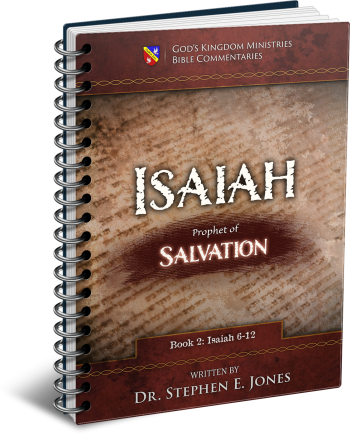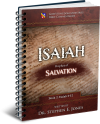Latest Posts
View the latest posts in an easy-to-read list format, with filtering options.

Isaiah is the prophet of Salvation. He is also known as the truly "Universalist" prophet, by which is meant that He makes it clear that salvation is extended equally to all nations and not just to Israel. He lived to see the fall of Israel and the deportation of the Israelites to Assyria, and he prophesied of their "return" to God (through repentance). He is truly a "major prophet" whose prophecies greatly influenced the Apostle Paul in the New Testament.
Category - Bible Commentaries

Isaiah accepted the call being issued by Adonay without really knowing what it involved. As with most of us even today, we may perceive a general direction or character of a calling without really knowing where it will lead us or the training that will be necessary to achieve success. Isaiah seems to have been totally blindsided by the calling that he had accepted. Who would have expected a call to give a message that would blind their eyes and make their ears deaf?
His writings, however, were given primarily for the benefit of the remnant of grace—those who were not blind and deaf, the few who were given ears to hear and eyes to see. Only later, when tribulation had run its course and when God would heal the eyes and ears of the people, would everyone be able to appreciate Isaiah’s message.
When Isaiah learned the strange nature of his call, he must have been a bit less enthusiastic about accepting it blindly. Perhaps he thought to himself, “I should have asked for more details before accepting this call.” No longer did he look forward to giving Adonay’s message to the nation, nor did he hope that this calling would last forever. Reversing course, he could only ask, “Lord, how long do I have to do this?” Isaiah 6:11 says,
11 Then I said, “Lord [Adonay], how long?” And He answered, “Until cities are devastated and without inhabitant, houses are without people, and the land is utterly desolate, 12 the Lord [Yahweh] has removed men far away, and the forsaken places are many in the midst of the land.”
Adonay (Christ) did not give Isaiah a specific time cycle, probably because the tribulation and desolation was to extend far beyond the prophet’s lifetime and ministry. The prophet expounded on this devastation later in Isaiah 24. Isaiah would not live to see the end of the downward spiral. In fact, he would live to see the desolation of Israel, but Jerusalem itself was spared for more than another century. Hence, the desolation remained incomplete for as long as Isaiah lived.
For us today, the good news is that the long tribulation cycle (since the fall of Jerusalem) has finally run its course. Our message today is one of hope, not tribulation. We anticipate the removal of the blindness that has veiled the eyes of the entire earth (Isaiah 25:7). The overthrow of the beast nations to which God has subjected the whole earth is fast approaching. The upheaval is not designed to bring us further into captivity but to set the earth free in anticipation of the fifth Kingdom of Daniel, which is the Stone Kingdom.
Isaiah 6:13 continues Adonay’s answer to the prophet’s question:
13 “Yet there will be a tenth portion in it, and it will again be subject to burning, like a terebinth or an oak whose stump remains when it is felled. The holy seed is its stump.”
During the time of tribulation, when most of the people are fulfilling the law of blindness, God promised to keep a remnant for Himself who were not subject to this blindness. These are the ones who respond when hearing the word of truth. Like the original disciples of Christ, these are the ones whom the Father has devoted to Jesus, and no one is able to pluck them out of His hand (John 10:28).
In the metaphor, the terebinth or oak tree is the nation as a whole, which is chopped down. It pictures both Israel and Judah being destroyed and desolated by foreign armies. Yet they leave a stump, whose roots remain intact. This stump is “the holy seed,” and “a tenth portion.” Even these “will again be subject to burning,” but their baptism of fire will come from the Holy Spirit, which cleanses and purifies them by burning away the chaff in their lives (Matt. 3:11, 12).
Adonay calls the remnant “the tenth portion,” that is, a tithe of the people. By understanding the law of the tithe, we are able to gain insight into the nature of the remnant.
The tithe was based on the laws of labor. The American Declaration of Independence established the principle of Protestantism that a man’s labor was his greatest property right and therefore could not be confiscated—not even by government taxation. Government could tax privileges that it had granted to men, but it could not tax God-given rights, such as one’s right to work.
The same right applied to God Himself, for He labored six “days” to create all things. He thus owns that which he labored to create and has the right to rule it according to His will (law).
God creates according to His sovereign will; man forms or shapes God’s creation according to his God-given authority. Each man’s labor still remains subject to the Creator, because man uses what God owns. Yet man’s labor gives him rights of ownership under God.
God gave man authority, by which he can claim the right to own his own labor and to enjoy private property rights without fear of theft, either by another man or by a government. God entered into a business relationship with men that respected each party’s rights. The object was to produce “fruit,” thereby increasing wealth and prosperity from the raw materials that God had created at the beginning.
In this arrangement, God provided the dirt, the rain, the sun, the air, the weather conditions, etc., while man provided the labor needed to be fruitful. (This includes the labor of women to bring forth sons and daughters.) As a reward, man was allowed to keep 90 percent of the fruit, while God claimed 10 percent as a reward for His labor. God owns “the tenth portion” by right of His labor at creation.
Thus, a tithe is due whenever men use God’s creation or reshape it to increase its value. If they chop down trees to make furniture, God owns the wood, but men own the furniture. Each owns what he labored to produce. So when a man chops down ten trees, he owes God one of them for the support of His Kingdom. He owes God every tenth fish that he takes from the sea. He owes God a tenth of the flocks and herds, a tenth of the grain from the field, and a tenth of the kilowatts from the power station.
Whatever portion of God’s creation that man shapes or adds value to by his own labor, he is allowed to keep 90 percent of it, while giving God 10 percent for His labor at creation.
Isaiah 6:13 tells us that this law also applies to the nation and to mankind in general. Though He owns all men by right of creation, at the present time His business contract with men divides the population into two portions. God gets the tenth portion—“the holy seed,” the remnant of grace, which has been set aside for His use.
During tribulation times, when the nation was desolate and the people enslaved in a distant land, God exercised His sovereign rights as the Creator to lay claim to His portion, so that righteousness would not altogether perish from the earth. Hence, Paul describes “grace” in terms of God’s sovereign choice—His will, not man’s will (Rom. 9:11, 16; 11:5, 6).
In other words, grace is not a matter of God helping man fulfill his own vow to be righteous; grace is the exercise of God’s sovereign will to choose people and to train them personally by His Spirit so that God can fulfill His vow to make us His people and to be our God.
The remnant of grace is the company of people who have been chosen by God to bear the light of truth during times of darkness and tribulation, when the world at large is blind and deaf, due to the judgment of God in the law of tribulation.
God shows His heart by setting forth a corollary to the law of the tithe in Lev. 27:31,
31 If, therefore, a man wishes to redeem part of his tithe, he shall add to it one-fifth of it.
In other words, if a man produces 100 bushels of wheat, he owes God 10 bushels for using God’s materials. He is instructed to bring these 10 bushels to the storehouse. But if he wishes to keep the grain for any reason, he may give money to the storehouse according to the value of the grain. Yet he must add one-fifth to the total value. Hence, instead of giving ten percent of what he has produced, he must give twelve percent of the value of his harvest.
God has used this law on a prophetic level in relation to the remnant of grace (or “overcomers”). Isaiah 6:13 identifies “the holy seed” as “the tenth portion,” but the amount is unspecified. We are told only that this “stump” will “be subject to burning,” and that this means they will receive the baptism of fire that John prophesied.
When the Holy Spirit was given in Acts 2, there were 120 disciples in the upper room (Acts 1:15). This group prophetically represented the remnant of grace at the time, that is, “the tenth portion,” God’s tithe company.
Yet it appears that God invokes the law in Lev. 27:31 to increase His tithe from 120 to 144. By adding one-fifth to the 120 in the upper room, the tithe is increased to 144, because one-fifth of 120 is 24. Adding 24 to 120 brings us to 144.
The numeric value of the name Lazarus is 144. This number refers to the resurrected ones. The biblical number 1000 signifies “glory.” So the number of this remnant of grace is given as 144,000. These are glorified in their resurrection, for they receive glorified bodies that are both immortal and incorruptible (1 Cor. 15:52, 53).
This gives us insight into the mind of God as expressed in His law. It also shows us how the law is prophetic, because all that God does in history is based upon the principles set forth in the law.
The remnant of grace remains as a “stump” so that the nation is not utterly destroyed. The stump stands as a beacon of hope that the tribulation will come to an end.